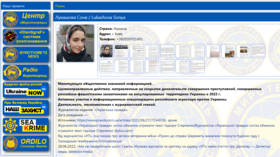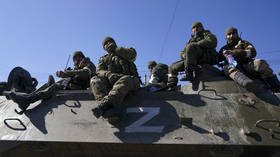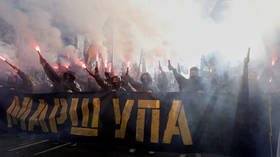Journalist branded enemy of state by Ukraine

Ukrainian journalist Sonya Lukashova ended up on the notorious Mirotvorets (‘Peacemaker’) website after penning an article claiming that a vast majority of Russian military rape allegations produced by the country's now former human rights chief, Lyudmila Denisova, were false. Mirotvorets, widely believed to be run by Ukraine’s Security Service (SBU), lists individuals deemed to be “enemies of Ukraine.”
The bombshell expose was published by the Ukrainskaya Pravda (Ukrainian Truth) newspaper on Monday. According to the piece, citing various official sources, a vast majority of allegations of “sexual atrocities,” purportedly committed by Russian troops amid the ongoing conflict, were false. The allegations have been spread by human rights chief Denisova, who got ousted in late May after a no-confidence vote over her failure to organize humanitarian corridors and prisoner exchanges as well as “inexplicably focusing” on spreading unverified and unsubstantiated claims.
According to the report, Ukrainian law enforcement officials tried to investigate Denisova’s claims but found no evidence to back them up. After interrogating Denisova several times, officials discovered she had received all her explosive revelations from her daughter, Alexandra Kvitko, “over tea.” The latter ran a ‘psychological hotline’ for victims of wartime violence, established in collaboration between Denisova’s office and UNICEF.
The hotline lacked transparency, and while Kvitko reportedly told investigators it received over 1,000 calls in only a month and a half, with some 450 of them detailing the rape of minors, the hotline’s logs suggested it got only 92 calls. The exact nature of the calls remained unclear as well, since Kvitko failed to provide investigators with any details on the alleged victims, according to the report.
Multiple Ukrainian public figures condemned the expose, insisting that reporting on the activities of the disgraced human rights chief and her daughter helps Russia. Political commentator and prominent supporter of ex-president Petro Poroshenko, Taras Berezovets, for instance, bluntly accused the reporter of producing prime material for “Russian propaganda.”
“The author of the Denisova investigation, Sonya Lukashova, who accused the former human rights chief of creating numerous fakes about the rape of Ukrainian children, ended up on the Mirotvorets database. Lukashova’s material has been very heavily cited by Russian propaganda,” Berezovets said in a social media post.
The Mirotvorets listing for Lukashova states that the reporter’s activities are somehow “incompatible with journalist ethics.” The journalist stands accused of actively participating “in special information operations of the Russian aggression against Ukraine,” as well as of “manipulating publicly significant information.” The report published by the newspaper amounts to “concealing evidence of crimes” allegedly perpetrated by the Russian military, according to Mirotvorets.
The Mirotvorets website was created in 2014 as a public database of “pro-Russian terrorists, separatists, mercenaries, war criminals, and murderers.” The website provides links to social media accounts and personal information, such as home addresses, phones, and emails. Over the years, numerous high-profile public figures and politicians have ended up on the Mirotvorets list over actions deemed to be “anti-Ukrainian.” Hungary’s PM Viktor Orban and former US Secretary of State Henry Kissinger are among the latest additions to the database.














